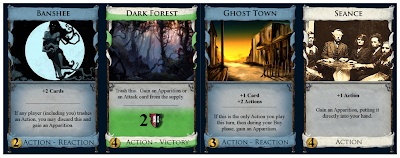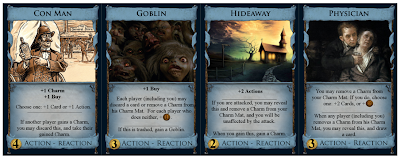Now we are going to get into a new, complex mechanic that
requires understanding a bunch of cards at once. There is a set of cards called Apparitions,
and a card called Poltergeist, which cannot be bought, and must be gained by
playing certain cards and fulfilling certain conditions. This mechanic isn't completely out of the
ordinary, since Dominion: Dark Ages takes advantage of this kind of thing, such
as with Hermit/Madman, Spoils, etc.
First, the fun card: Poltergeist.
I spent quite a lot of time working and reworking
Poltergeist, and I think I finally hit something that works without being to
devastating. My original card was
something like "Trash a card from your hand; each other player gains
Curses equal to its cost." This was
intended to be a very harsh card, but it would be exceedingly difficult to get;
however, I found that it was easy to get a Poltergeist early game (as I'll
explain later), and the Curses would be gone in minutes. So next I cut it in half, by saying that each
player got Curses equal to half the cost of the trashed card.
Didn't matter; it was still ridiculously overpowered. The variance of cost of the trashed card
meant that a player could send a game spiraling down into chaos. It was good for a laugh, but ultimately it
became too frustrating.
But I didn't give up.
I knew I wanted a Poltergeist, and I knew I wanted it to be hard to get,
and I knew I wanted it to be a great card to get--but not necessarily so
powerful that you'd be a fool not to go for it.
It had to be a risk to attempt to get that might pay off later, and each
player would need to decide if it was worth it in any game.
So I think I finally came up with a solution, which is this
final card. You still must trash a card,
but it does different things depending on the type, similar to cards like
Ironworks or Tribute (from Dominion: Intrigue).
Also, here, it is no longer strictly an attack, so it's not just for
evil players anymore.
But how do you get a Poltergeist, if it's not in the
supply? With these:
 |
| They don't really need to be purple; it just looked good. |
There are only a few of each kind of Apparition, and all
four get shuffled together and placed face-down, similar to Ruins from
Dominion: Dark Ages. On the surface,
they seem nearly as useless as Ruins, as well.
However, they act as an intermediate step on the way to getting
Poltergeist.
I also tried a few variations of these, before landing on
the condition to gain a Poltergeist. I
tried "If you already played another action this turn, trash this and gain
a Poltergeist." But that was far
too simple, which led to a quick Poltergeist.
So I upped the ante, and said you must also trash the Action you
previously played. Didn't matter. How about if you gain a Curse yourself? Well, sure, that kind of works, but now it's
too big of a risk, and players are highly unlikely to go for it.
So ultimately I tossed out most of those ideas, and came up
with this one. I decided that buying a
Victory card is something that rarely happens early game (unless you've got
something like Island from Dominion: Seaside
or Great Hall from Dominion: Intrigue), so the odds are a bit fairer that you'd
decide to clog your deck so quickly. And
besides, even if you do want to get a Poltergeist quick, it's been nerfed a
fair bit.
And, of course, Apparitions aren't in the supply, so how do
you get them? Well, here are a few cards
that might give you an Apparition:
 |
| And more to come! |
Each of these gains you an Apparition in a slightly
different way.
Banshee gets you an Apparition if you or another player
trashes an Action, but that's a fairly rare occurrence (some games don't even
have a way to trash Actions), so I made the card cheap and you get a basic
bonus along with it.
Dark
Forest requires you to
trash itself. So do you want to lose two
Victory Points for an Apparition (or another Attack card)?
Ghost Town is your basic Village-type card, and since the
big bonus of Villages is the 2 Actions, you kind of get the consolation prize
of an Apparition if that's the only Action you end up playing. But you've got to be careful with this card,
since it's a mandatory gain. If you
don't want to get stuck with Apparitions if that's not your strategy, getting a
bunch of Ghost Towns early game (like is often the case with Village cards) is
not ideal for you.
Seance is another one that has a mandatory Apparition gain,
but since that is almost all it does, you'll only want to get it if that's what
you're going for. It used to have a more
interesting combo behind it, when playing an Apparition meant you trashed the
Action you previously played; since Seance gives you an extra action, and puts
the Apparition in your hand, you basically play the Seance to blast through the
Apparition stage of the combo and go straight to Poltergeist. That interesting mechanic has been lost, but
it's for the better, I think, considering how much better the
Apparition/Poltergeist mechanic works overall now.







